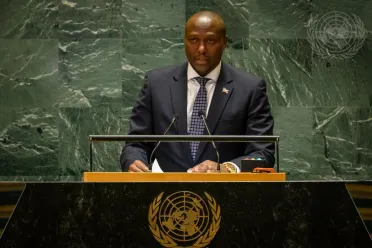Statement
Statement summary
RUSSELL MMISO DLAMINI, Prime Minister of Eswatini, said his country joins this General Assembly with unwavering dedication to the principles of peace, sustainable development and human dignity. “There is a need to reconsider the operations of the multilateral institutions such as the IMF [International Monetary Fund] and the World Bank and particularly the Security Council,” he stressed, recalling that in 2005, his country hosted the African Union meeting that resulted in the Ezulwini Consensus which articulated Africa’s common position on the reform of the UN. “We urge the global community to implement these long-standing commitments and ensure that all regions and peoples have a voice in shaping our collective future,” he said, adding that his country embraced the spirit of “Nkwe” which means “run” — this national ethos symbolizes the collective resolve to accelerate progress towards achieving the SDGs. “Nkwe is our rallying cry to run faster, to work harder and to leave no one behind,” he said.
Since Africa is the youngest continent in the world, he said that Eswatini is committed to harnessing this demographic dividend by investing in youth. “We must act now to ensure that our youth can participate fully in building the Africa we want, an Africa of peace, prosperity and dignity,” he emphasized, adding that poverty remains one of the greatest challenges facing the continent. He said Eswatini is committed to eradicating poverty through inclusive growth and robust social protection programmes and urged the international community to support these efforts by promoting fair trade, increasing development assistance and fostering partnerships that create jobs and uplift communities.
“However, as a small, middle-income country, we face unique challenges, including limited access to international financing, vulnerability to climate change and economic shocks,” he said, calling on the international community to support the developmental aspirations of countries like Eswatini. “Eswatini has put forth a comprehensive SDG Recovery and Acceleration Plan, valued at $1.6 billion, covering diverse areas including digital transformation, renewable energy, agriculture, industrial expansion and social protection,” he noted. “The current global financial architecture is not fit for purpose and must be reformed to make the financing more accessible and equitable,” he stressed, urging to support the reform of global financial mechanisms that have seen developing countries pay much higher costs than developed nations to access the much-needed funds.
He also condemned all forms of violence and supported efforts aimed at silencing the guns across the world, particularly in Africa. As his country continues to grapple with significant health challenges, he called for collaborative efforts in strengthening health systems, enhancing disease surveillance and building capacity for rapid response to health emergencies. Turning to climate change, he said his country developed a comprehensive strategy to mitigate and adapt to the impacts of this change, investing in renewable energy, sustainable agriculture and disaster risk reduction. “We are also proud to announce that Eswatini has recently adopted a ban on single-use plastics,” he said, calling upon developed nations to honour their commitments to climate finance and technology transfer. “It is only through collective action that we can ensure a sustainable future for all,” he stressed. “Ironically, Taiwan and its 23.5 million people continue to be left by the United Nations and its specialized agencies,” he continued, calling for their inclusion, so that they can also fully participate in global development. “May we all embrace the spirit of Nkwe and let us run together with accelerated speed towards our shared goals and ensure that no one is left behind,” he concluded.
Full statement
Read the full statement, in PDF format.
Photo

Previous sessions
Access the statements from previous sessions.
